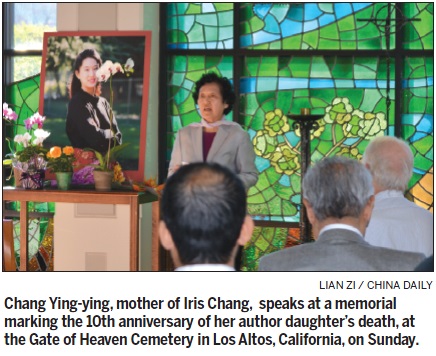San Jose, Nov. 12, 2014, — Iris Chang, who is credited with increasing awareness of wartime atrocities in Asia with her famous book The Rape of Nanking: The Forgotten Holocuast of World War II, was remembered on the 10th anniversary of her death Sunday.

The Rape of Nanking, published in 1997, chronicled the Nanking massacre (1937-38) and the atrocities committed during it by the Imperial Japanese Army during the War of Resistance against Japanese Aggression (1937-45).
Chinese American politicians such as Barry Chang, a member of the City Council of Cupertino, California; representatives of The Global Alliance for Preserving the History of WWII in Asia (GA); the Rape of Nanking Redress Coalition (RNRC) and the Alliance for Preserving the Truth of the Sino-Japanese War (APTSJW) attended the memorial next to her gravesite at the Gate of Heaven Cemetery in Los Altos, California, along with Iris Chang’s family and friends.
In 2004, Iris Chang took her own life at age 36 with a self-inflicted gunshot wound while sitting in her car near Los Gatos, California.
At the time, Chang, who was battling depression, had been working on a book about the notorious Bataan Death March in 1942, in which Filipino and American prisoners of war were massacred by Japanese troops.
“The memorial is not only to mourn our loss, but also to celebrate her life,” said Chang Ying-ying, Iris Chang’s mother. “We don’t want to incite hatred, but to remember the history and maintain the peace.”
“I met with Iris Chang before she started writing the book,” said Barry Chang. “She was a really nice and dedicated person. She did lots of research before writing the book. It was not easy for a young lady to do so many things to preserve the history of war.”
Ding Yuan, the executive vice-president of the GA, was impressed by Chang’s determination and said he provided her with materials such as historical photos for her book.

Several authors had written about the Nanking Massacre in Chinese before and one had written about it in English in the 1960s. But Iris Chang, who was born in Princeton, New Jersey, in 1968, to university professors who had emigrated from Taiwan, saw the book she had written at age 29 become a New York Times bestseller. It was eventually translated into seven foreign languages.
Chang’s first book, Thread of the Silkworm (1995), told the story of Chinese professor, Tsien Hsue-shen, a founder of NASA’s Jet Propulsion Laboratory who was accused of being a spy and a Communist during the Red Scare in the US. Tsien was put under house arrest from 1950 to 1955.
Chang’s third book, The Chinese in America (2003), detailed how Chinese Americans were viewed as outsiders despite their contributions to American society.
Chang was remembered in a 2007 biography, Finding Iris Chang, and a 2007 documentary, Iris Chang: The Rape of Nanking. There is a bronze statue of her at the Nanjing Massacre Memorial Hall in Nanjing, China.
Her mother established the Iris Chang Memorial Fund to sponsor American and Canadian high school and college teachers for a two-week study tour in China each summer.
“We want to provide them first-hand experiences of the Sino-Japanese War history and hope they can bring this part of history back to Western public education,” she said.
(China Daily USA 11/10/2014 page2)